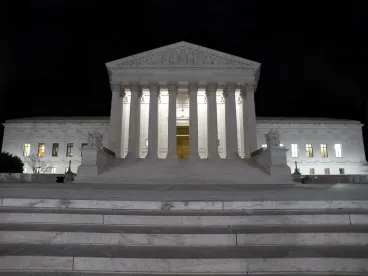The US Supreme Court’s recent decision in Cedar Point Nursery et al. v. Hassid et al., No. 20-107 (June 23, 2021), a case pitting agricultural employee rights to freedom of association and self-organization under California law, against employer private property rights of California agricultural employers, marks a clear victory for property rights.
The Cedar Point Decision
At issue in Cedar Point was whether a California union ‘access regulation,’ which guaranteed labor organizations a “right to take access” to an agricultural employer’s property in order to solicit union support, constituted a per se ‘taking’ under the Fifth and Fourteenth Amendments.
The regulation at issue – Cal. Code Regs., tit. 8, section 20900(e)(1)(C) – granted union (non-employee) organizers a right to physically enter and occupy the agricultural employer’s land for three hours per day, 120 days per year. For context, this access regulation was promulgated in response to unique concerns that “alternative channels of effective communication which have been found adequate in industrial settings do not exist or are insufficient in the context of agricultural labor.” Cal. Code Regs., tit. 8, section 20900 (C). To further bolster agricultural labor protections, interference with organizers’ right of access was deemed an unfair labor practice, for which an employer could be sanctioned
The Takings’ Clause in the Fifth Amendment of the US Constitution, applicable to the states via the Fourteenth Amendment, prohibits the government from taking private property without providing the owner just compensation.
The Petitioners (employers) – a strawberry grower, and a grapes and citrus grower and shipper – argued that the access regulation grants labor organizations a right to access the employers’ property at will. Because the right to exclude others is a central tenant of private property laws, the Petitioners reasoned, the appropriation of the right to exclude was a per se physical taking.
Respondents invited the Court to instead view the regulation as a restriction on the employers’ ability to use their own property. So called “use restrictions” are generally not considered per se takings, and are subject to a more deferential analysis to determine whether the owner is entitled to just compensation.
The Court rejected Respondents’ position, finding that the regulation at issue appropriates for the enjoyment of third parties the owners’ right to exclude others from the property. In other words, government mandated access to private property – even if not permanent and continuous – can be physical takings requiring just compensation. As such, the Court held that the access regulation constitutes a per se taking, a violation of the Fifth and Fourteenth Amendments upon which a valid claim for relief (including injunctive relief) may be stated.
Limitations of Cedar Point: Not All Access Regulations Constitute a Per Se Physical Taking
The Court additionally provided some limitations and carve outs to its Cedar Point holding particularly important in the organized labor context.
First, restrictions on how a business generally open to the public may treat individuals on the premises are readily distinguishable from regulations granting a right to access property closed to the public. The agricultural employer properties in Cedar Point were not generally open to the public. This is similar to many places of employment, such as mines, factories and the like.
By contrast, a regulation pertaining to how a business open to the public may treat individuals on the premises is unlikely to be deemed a per se taking. This is because the employer’s property – or at least substantial parts of it – are already accessible by third parties. Government regulation of the private property rights of these businesses would, in the ordinary case, be assessed under the factors identified in Penn Central Transportation Co. v. New York City, 438 U.S. 104. Those factors include weighing items such as the economic impact of the regulation, its interference with reasonable investment-backed expectations, and the character of the government action. Id., at 124.
Second, government-authorized access which is consistent with common law privileges such as public or private necessity, are not “takings.” In his concurrence, Justice Kavanaugh expanded upon the majority’s recognition of this point, and distinguished the holding in Cedar Point from NLRB v. Babcock & Wilcox Co., 351 US 105 (1956). In Babcock the Court stated that a non-employee union organizer might be entitled to access to an employer’s property in the unusual circumstances where the employees were otherwise “beyond the reach of reasonable efforts to communicate with them.” Justice Kavanaugh likened this to the common law ‘necessity’ exception to allow a trespassing, not a taking. But the regulation in Cedar Point could not fall within such a narrow exception because it granted formal entitlement to regularly access to the employer’s property, even though none of the agricultural employees lived on site and were not beyond the reach of reasonable efforts to communicate with them.
What Does the Future Hold?
It will be of interest to see how durable Justice Kavanaugh’s analogy to the necessity doctrine will be in future NLRA cases, especially in light of the revolutionary developments in digital and personal communications formats and devices in the over sixty years since Babcock was decided. And, while the Court acknowledged at least some type of “highly contingent access right . . . recognized under the NLRA,” the implications of the Cedar Point holding for NLRB cases involving discriminatory denial of access and off-duty employee access are as yet unclear. See, Cedar Point, 594 U.S. __, slip op. at 15.
The Cedar Point decision also acknowledged that the government may require property owners to cede a right of access as a condition of receiving certain benefits (such as a permit, license, or registration) without causing a taking. So long as the permit condition bears an ‘essential nexus’ and ‘rough proportionality’ to the impact of the proposed use of the property, no taking has occurred. However, it continues to be of interest whether and how the “essential nexus” and “proportionality” requirements might constitute key elements in challenges to other government actions, such as conditioning environmental permits, operating licenses and the like, on businesses agreeing to remain neutral in labor organizing campaigns and other similar requirements.
In sum, the Cedar Point decision constitutes a significant victory for the private property rights of employers, and may presage further parallel developments under the NLRA and in other government actions.




 />i
/>i

